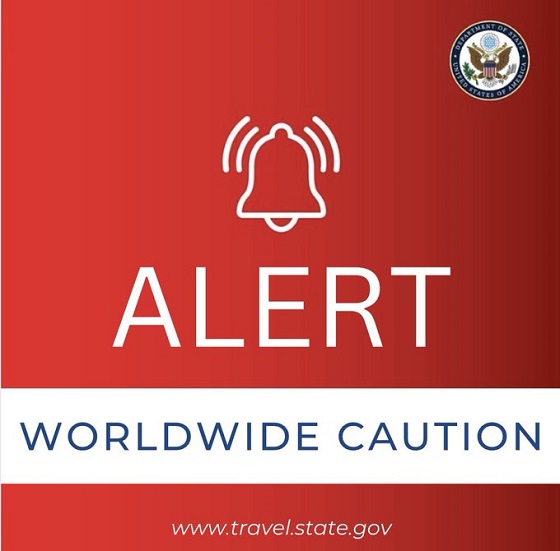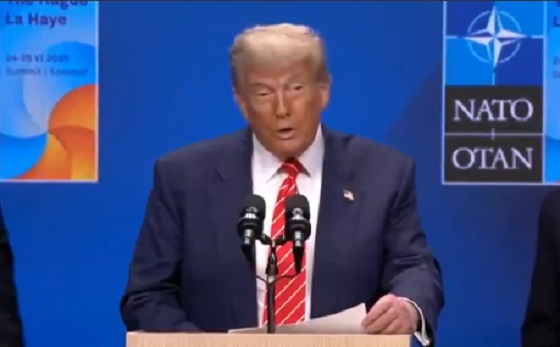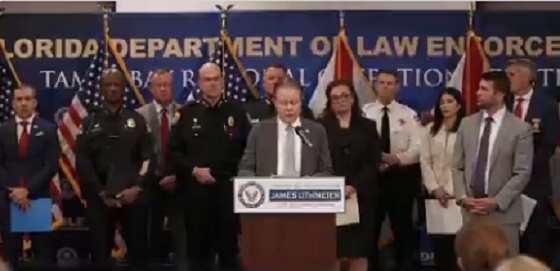conflict
Americans abroad told to stay alert as Iran threatens retaliation

Quick Hit:
The State Department over the weekend warned Americans abroad to “exercise increased caution” in the aftermath of U.S. military strikes that destroyed three major Iranian nuclear facilities.
Key Details:
-
In a worldwide security alert, the State Department warned U.S. citizens to remain vigilant abroad due to the fallout from the strikes, which targeted Iran’s Fordow, Isfahan, and Natanz nuclear facilities.
-
“There is the potential for demonstrations against U.S. citizens and interests abroad,” the alert stated, noting that the Israel-Iran conflict has already caused airspace closures and travel interruptions across the Middle East.
-
Iran’s U.N. Ambassador accused the U.S. of “destroying diplomacy” and warned that Iran’s military would determine a “proportionate response.” President Trump, in turn, vowed that any retaliation from Iran would be met with overwhelming force.
Diving Deeper:
The U.S. State Department issued a global security alert late Saturday, urging Americans overseas to exercise heightened awareness and caution following a major military operation that struck three of Iran’s most critical nuclear enrichment sites. The warning follows a surge in tensions between Iran and Israel, which have increasingly drawn in the United States.
“The conflict between Israel and Iran has resulted in disruptions to travel and periodic closure of airspace across the Middle East,” the State Department said. “There is the potential for demonstrations against U.S. citizens and interests abroad.”
The warning came just hours after President Donald Trump confirmed that the United States had launched what he called “massive precision strikes” on the Fordow, Isfahan, and Natanz nuclear sites in Iran. “Tonight, I can report to the world that the strikes were a spectacular military success,” Trump declared. “Iran’s key nuclear enrichment facilities have been completely and totally obliterated.”
The operation marks one of the most significant escalations in U.S.-Iran relations in recent years. Trump had been tight-lipped in the lead-up to the strikes, telling reporters beforehand that “nobody” knew what he planned regarding Iran’s nuclear program.
In response, Tehran condemned the attacks. Speaking before an emergency session of the U.N. Security Council, Iranian Ambassador Amir Saeid Iravani claimed the U.S. had “decided to destroy diplomacy” and warned that a military response was imminent.
Meanwhile, Iranian Foreign Minister Abbas Araghchi reportedly traveled to Moscow on Sunday to meet with Russian officials, a sign that Tehran may be seeking support from its key strategic partner as it formulates its next move.
President Trump made clear on social media that the United States would not tolerate further aggression from Tehran. “ANY RETALIATION BY IRAN AGAINST THE UNITED STATES OF AMERICA WILL BE MET WITH FORCE FAR GREATER THAN WHAT WAS WITNESSED TONIGHT,” Trump posted on Truth Social. “THANK YOU! DONALD J. TRUMP, PRESIDENT OF THE UNITED STATES.”
With tensions running high and travel in parts of the Middle East already constrained, Americans abroad are being advised to avoid public gatherings, monitor local media, and follow instructions from local U.S. authorities.
conflict
Fordow obliterated: Israeli report confirms nuclear site inoperable

Quick Hit:
Israel confirmed Wednesday that the U.S. airstrike on Iran’s Fordow nuclear site over the weekend caused severe damage, rendering the facility “inoperable.” Israeli officials say the operation has significantly delayed Iran’s nuclear ambitions.
Key Details:
- The Israeli Prime Minister’s Office said the U.S. strike destroyed key infrastructure at Fordow and crippled Iran’s uranium enrichment capability at the site.
- The statement, delivered on behalf of the Israel Atomic Energy Commission, concluded that combined U.S. and Israeli strikes have set Iran’s nuclear weapons program back “by many years.”
- President Trump praised the success of the operation during remarks at the NATO summit in Brussels, calling it a “joint Israeli-American victory” and likening it to Israel’s decisive 1967 Six Day War.
.@POTUS reads a letter from the Atomic Energy Commission of Israel, stating that "the devastating U.S. strike on Fordow destroyed the site's critical infrastructure and rendered the enrichment facility totally inoperable." pic.twitter.com/KDFjLJ5pJf
— Rapid Response 47 (@RapidResponse47) June 25, 2025
Diving Deeper:
On Wednesday, the Israeli government released an official statement confirming that a U.S. airstrike on Iran’s Fordow nuclear facility had effectively shut down operations at the controversial site. The announcement came shortly after President Donald Trump previewed the findings during a press conference at the NATO summit in Brussels, noting that Israeli intelligence would provide details on the mission’s results.
“The devastating U.S. strike on Fordow destroyed the site’s critical infrastructure and rendered the enrichment facility inoperable,” read the statement issued by Prime Minister Benjamin Netanyahu’s office on behalf of the Israel Atomic Energy Commission. The report concluded that the joint American and Israeli military campaign had “set back Iran’s ability to develop nuclear weapons by many years.”
Officials added that this delay in Iran’s nuclear capabilities could continue “indefinitely,” provided Tehran is prevented from obtaining new sources of nuclear material.
Fordow has long been one of the most heavily fortified and secretive components of Iran’s nuclear program, buried deep beneath a mountain near the city of Qom. Intelligence analysts had previously identified it as a central hub for uranium enrichment—one of the final steps in developing a nuclear weapon.
President Trump, who authorized the airstrikes over the weekend, hailed the mission’s outcome as a strategic triumph. Referring to the brief but intense military confrontation as the “12 Day War,” Trump drew historical parallels to Israel’s famed Six Day War in 1967, underscoring the speed and precision of the operation.
“This was a joint Israeli-American victory,” Trump said. “And we achieved it without a prolonged conflict or massive deployment.”
The Fordow strike followed a series of precision attacks by Israel on other elements of Iran’s nuclear and military infrastructure. Together, the coordinated efforts appear to have dealt a major blow to Tehran’s nuclear ambitions, though experts caution that Iran’s response in the coming weeks remains uncertain.
The Israeli report marks the first formal assessment from a government directly involved in the strikes and is likely to shape future international discussions on Iran’s nuclear path.
conflict
Despite shaky start, ceasefire shows signs of holding

Chief of the General Staff LTG Eyal Zamir during a situational assessment following the beginning of the ceasefire with Iran
Quick Hit:
A fragile ceasefire between Israel and Iran appeared to hold Tuesday after early strikes from both sides threatened to unravel it. President Trump, who brokered the deal, criticized the violations and pushed both nations to stand down.
Key Details:
- Trump declared a “complete and total ceasefire” late Monday after Iran fired missiles at a U.S. base in Qatar in response to American strikes on its nuclear sites.
- Hours after the ceasefire was set to begin, Israel accused Iran of violating it by firing missiles into its territory—claims Tehran denied, even as explosions and air raid sirens rocked northern Israel.
- Trump publicly criticized both nations, stating “they don’t know what the f*** they’re doing,” and later confirmed that Israeli warplanes would turn back instead of launching a broader retaliation.
Diving Deeper:
Calm returned to parts of the Middle East Tuesday as a U.S.-brokered ceasefire between Israel and Iran began to settle in—though not without incident. For nearly two weeks, the region was on the brink of a broader war, ignited by Israeli strikes on Iranian nuclear and military targets and exacerbated by retaliatory attacks from Tehran.
President Donald Trump took credit for halting the hostilities. “ISRAEL is not going to attack Iran,” he wrote on Truth Social. “All planes will turn around and head home, while doing a friendly ‘Plane Wave’ to Iran. Nobody will be hurt, the Ceasefire is in effect!”
Despite the ceasefire’s official start early Tuesday morning, it nearly unraveled within hours. Israeli officials said Iran launched at least two missiles after the truce deadline, though they were intercepted before impact. Iran, meanwhile, denied any post-deadline strikes and blamed Israel for earlier attacks.
Speaking before leaving for a NATO summit, Trump said both sides had violated the agreement and did not hold back his frustration. “We basically have two countries that have been fighting so long and so hard that they don’t know what the f*** they’re doing,” he said, adding that he was “not happy with Israel.”
Still, the agreement held. Israeli Prime Minister Benjamin Netanyahu’s office said the country stood down from further attacks following a direct conversation with Trump. Israel claimed to have achieved its objectives, including weakening Iran’s nuclear and missile capabilities.
The conflict’s origin traces back to Israeli fears that Iran was nearing the threshold of building nuclear weapons, despite Tehran’s insistence that its program is for peaceful energy purposes. Over the weekend, the U.S. deepened its involvement by launching bunker-buster bombs on Iranian nuclear sites. Iran responded with a limited strike on a U.S. base in Qatar—an attack Washington said came with advance warning and caused no casualties.
Meanwhile, fallout from the war continues to spread. Israeli officials said at least 28 of their citizens have been killed and over 1,000 injured. Iranian casualty estimates are far higher, with nearly 1,000 reported dead, including hundreds of civilians and military personnel, according to the Human Rights Activists group.
Even as the ceasefire sets in, the risk of broader conflict remains. Pro-Iran militias in Iraq reportedly launched drone attacks on U.S. bases overnight, though they were intercepted without casualties. The U.S. has begun evacuating American citizens from Israel, and China—one of Iran’s few remaining oil buyers—has condemned the U.S. strikes, warning of a dangerous cycle of escalation.
Trump said he is not seeking regime change in Iran, walking back prior comments. “Regime change takes chaos and, ideally, we don’t want to see much chaos,” he told reporters aboard Air Force One.
Still, the situation remains volatile. The ceasefire, while welcomed, remains fragile—held together largely by Trump’s pressure campaign and the willingness of both sides to pause, if only momentarily, from what could have spiraled into an uncontrollable regional war.
-

 Also Interesting2 days ago
Also Interesting2 days agoTop 7 Features Every Canadian Home Care Agency Needs in Their Home Care Software
-

 conflict2 days ago
conflict2 days agoWar over after 12 days? Ceasefire reached between Israel, Iran
-

 Business2 days ago
Business2 days agoCanada should already be an economic superpower. Why is Canada not doing better?
-

 Crime2 days ago
Crime2 days agoFlorida rescues 60 missing kids in nation’s largest-ever operation
-

 Also Interesting2 days ago
Also Interesting2 days agoDiscover hidden paths – Uncover nature’s secrets in Central Alberta
-

 Business2 days ago
Business2 days agoYounger Casino Bettors Are Upping the Ante on Risky Gambling in British Columbia, Documents Show
-

 Business2 days ago
Business2 days agoWhile China Hacks Canada, B.C. Sends Them a Billion-Dollar Ship Building Contract
-

 Bjorn Lomborg1 day ago
Bjorn Lomborg1 day agoThe Physics Behind The Spanish Blackout






